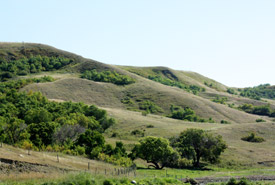Engaging post secondary students in real-world conservation

Fairy Hill, SK (Photo by NCC)
Over the past few years, science and stewardship staff in the Nature Conservancy of Canada's (NCC's) Saskatchewan Region have been working closely with universities to engage post-secondary students in conservation work in the province. A key issue that many students raise is that they often struggle with relating the theory they are learning in school with practical, real-world examples that are relevant to their own life experiences. It is often difficult for students to relate to examples that are thousands of miles way in another country. On the other hand, learning about real-world conservation issues that are happening in their own backyard becomes very engaging for students.
NCC saw this as a potential opportunity. University professors are always looking for fresh projects and content for their courses, so working together is a natural fit. Over the past few years, NCC staff have given several presentations to various university classes and students have been involved in several projects that have helped answer some of the questions raised in our conservation planning programs.
A great example of this is a project that is currently underway at the College of Agriculture and Bioresources at the University of Saskatchewan. Students are currently exploring several questions that were raised in NCC's management plan for our Buffalo Valley preserve in south-central Saskatchewan. Through students' research, NCC hopes to gain valuable knowledge about the biodiversity and natural processes taking place on the preserve, which will be used inform NCC's management of the property.
The students are currently exploring four topics:
- The historic fire frequency in the area and whether fire should be returned to the landscape as a management tool;
- The ideal mosaic of range and riparian health for the property;
- How grazers such as bison and cattle be best managed and what impacts they have on the biodiversity of the property;
- What role the saline wetlands on the property play in the overall biodiversity of the property.
The program has been a win-win-win situation. Faculty at the Saskatchewan universities are getting fresh content and innovative projects for their students. Students are more engaged in their learning because they are contributing to real-world problems in their own backyard. In addition, students are gaining valuable real-world experience that they can take with them into their professional lives.
From NCC’s perspective, we are gaining valuable information that is informing our on-the-ground conservation initiatives. As an added bonus, students learn about NCC’s mission and often become further engaged in NCC’s work through our volunteer and internship programs. This creates a wonderful pool of new professionals who are actively engaged in the conservation of Saskatchewan’s biodiversity.
NCC hopes these partnerships continue to grow and evolve so that we can reach out to more and more students across the province.
Some feedback from students and faculty that have been involved in the partnerships to date:
“I want to thank you for giving a presentation on NCC's conservation efforts on the Missouri Coteau as well as the importance of landscape connectivity in your conservation planning. Most importantly, I think it was an eye-opener for students to see how conservation efforts are conducted in Saskatchewan's landscapes and what some of the students might be involved in after graduating. I also thank you for your assistance thus far in the term project involving the Buffalo Valley Preserve. It will be interesting to see how the students deal with the real-world conservation issues at Buffalo Valley. Hopefully the information they provide will be of value to NCC.” ~ Jim Romo (Professor, College of Agriculture, University of Saskatchewan)
“After the course was finished...I was extremely proud of the work we accomplished. I also found it much easier to learn new skills when dealing with real-world situations...” ~ Matthew Holmes, B.Sc. RRM (Renewable Resource Management student, University of Saskatchewan)

